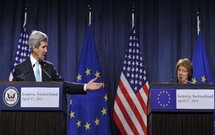 After several hours of foreign minister-level negotiations among Russia, Ukraine, the European Union and the United States in Geneva on April 17, Russian Foreign Minister Sergei Lavrov and U.S. Secretary of State John Kerry announced in separate press conferences that the four sides have agreed on a document calling for de-escalation in eastern Ukraine.
After several hours of foreign minister-level negotiations among Russia, Ukraine, the European Union and the United States in Geneva on April 17, Russian Foreign Minister Sergei Lavrov and U.S. Secretary of State John Kerry announced in separate press conferences that the four sides have agreed on a document calling for de-escalation in eastern Ukraine.
The document demands that protesters lay down their arms and vacate occupied buildings in the region. In return, the Kiev government will begin decentralizing power and will offer amnesty to protesters, except those found guilty of capital crimes.
For both the Western governments and the Kremlin, the outcome of these discussions represents a significant move toward compromise. Kerry said that Russia has the ability to affect the outcome of the crisis in Ukraine, emphasizing Russia's role in the decision-making process regarding Ukraine's future. He also noted that the annexation of Crimea was not discussed during the talks and that Kiev is open to giving significant new powers to Ukraine's regions.
Lavrov highlighted the need to protect the rights of Russian speakers in Ukraine and take into account the concerns of Ukrainians living in the southeastern regions of the country. He also pointed out that the term "federalization" -- a longstanding Russian demand -- is not included in the document, though giving greater autonomy to the regions was discussed.
Russia has argued that Kiev must introduce constitutional reforms, federalization and language rights for Russian speakers. Since February, Moscow has also emphasized the illegitimacy of the authorities in Kiev and criticized their inability to adequately represent all of Ukraine's regions. By agreeing to a joint document with Ukraine's acting foreign minister and by engaging in talks regarding decentralization as opposed to federalization specifically, Moscow is signaling its willingness to offer significant concessions in an effort to de-escalate the crisis.
Earlier in the day, Russian President Vladimir Putin, in a televised question-and-answer session, laid out Russia's levers in its negotiations with the West regarding Ukraine. While declaring that he does not want to invade Ukraine, Putin emphasized that the Federation Council of Russia has granted him the right to use the armed forces in Ukraine, and that the authorities in Kiev committed a "serious crime" in using military force against civilian protesters.
Moreover, Putin said that it is unlikely the Europeans would harm their own economies by stopping natural gas imports from Russia. Putin also shifted his language on federalization, praising Kiev's recent discussion of decentralization. The Kremlin is willing to set aside the semantics of decentralization versus federalization in order to de-escalate the crisis, as long as some sort of shift occurs in Ukraine's power structure that strengthens the regions.
Despite Russia's advantages when it comes to Ukraine, there are significant constraints that motivated the Kremlin to compromise with the West and Kiev. In the past few days, there have been calls in capitals such as London and Berlin -- which were previously hesitant about sanctions on Russia -- for Europe to move to the next phase of sanctions should Russia fail to cooperate in de-escalating the crisis (although the European rhetoric on sanctions has been relatively weak thus far, with threats of more visa and asset freezes, which do not faze Moscow at this time).
While the Kremlin allegedly has supported armed protesters throughout eastern Ukraine, Ukraine's geography and several logistical challenges make any potential direct Russian military involvement in Ukraine difficult and unlikely. The Kremlin demonstrated its ability to destabilize eastern Ukraine, but the limitations on its potential future actions make it willing to grant concessions in order to influence Ukraine's future.
For the West, the results of today's talks are similarly the result of significant constraints. The European Union is very divided in its view of what form the next round of sanctions should take, while the United States, despite providing the Ukrainian military with some non-lethal aid in the form of rations, is unlikely to lend the government in Kiev significant military protection.
Like many European governments, Washington is hesitant to impose more sanctions on Russia, fearing the potential negative impact on U.S. companies operating in the country. Both sides, therefore, are advocating for de-escalation and willing to make significant concessions in order to stabilize the situation in eastern Ukraine -- although the agreement reached April 17 is merely an initial step that is far from a definitive end to the crisis.
Courtesy : Stratfor (www.stratfor.com)